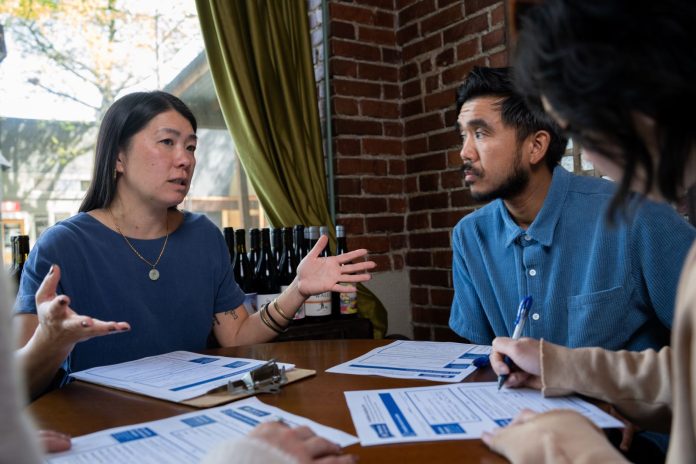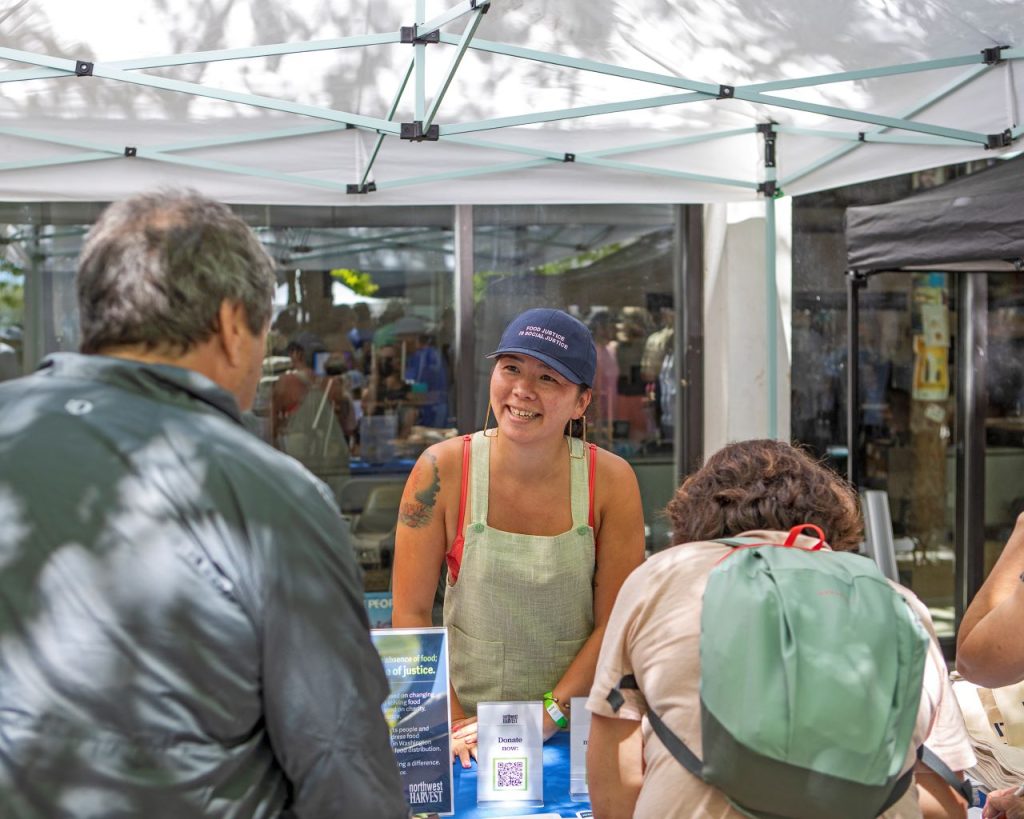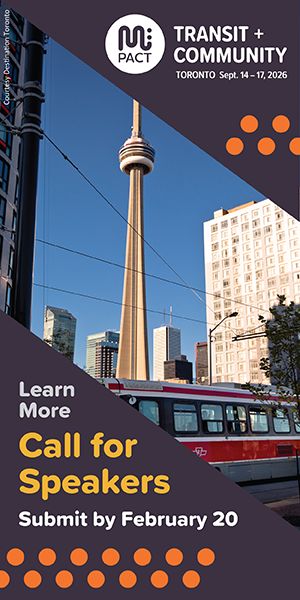
Longtime small business and workers’ rights advocate Jeanie Chunn jumped into the race for Seattle City Council District 2 only a short time before the filing deadline earlier in May.
The resignation of Tammy Morales from the D2 seat led to the temporary appointment of Mark Solomon, who will serve until a new council member is elected in November. Whoever prevails will serve the remaining two years of Morales’s original term before the position is again up for election.
District 2 is the most diverse district in Seattle, and Chunn brings strong progressive credentials to her campaign. Three other candidates are vying for the spot: Assistant City Attorney Eddie Lin, transportation advisor Adonis Ducksworth, and union steward Jamie Fackler. Lin and Ducksworth entered the race earlier in the year, giving them a headstart in raising campaign funds.
Workers’ rights and food insecurity
Chunn is the daughter of immigrants. She says she was literally born into the restaurant business, with her mother bartending the day before going into labor. Chunn moved to Seattle in 1999 to attend the University of Washington. As a single mom, she was able to live in Seattle, use Apple Care for health care, and raise her daughter as she worked her way up in the restaurant industry.
“That’s not really reality for folks anymore, unless they’re spending 50, 60% of their income on their rent,” Chunn told The Urbanist.
At the beginning of the Covid-19 pandemic, Chunn was laid off from her job at the Sea Creatures restaurant group, after which she formed a restaurant coalition to support small restaurant owners and was asked to join the Independent Restaurant Coalition. In this position, Chunn was able to advocate for free outdoor street permitting, caps on delivery app fees charged to restaurant owners, and requirements that all restaurants require proof of vaccination for people to dine indoors.

Chunn also worked with Working Washington on the Pay Up legislation – mandating a minimum wage and worker protections for app-based workers – and with Councilmember Teresa Mosqueda’s office on the JumpStart payroll tax. If elected, Chunn vows to protect the JumpStart tax from going to the City’s general fund instead of paying for its legislated spending plan, which includes investments in affordable housing and the Green New Deal.
At the same time Chunn worked for One Fair Wage, advocating for restaurant workers to receive a full minimum wage with tips on top. Chunn’s work led to the elimination of the sub-minimum wage in Washington, DC and the state of Michigan. Chunn was also appointed to serve on the Labor Standards Advisory Committee and is deeply committed to making sure Seattle’s Office of Labor Standards is well funded.
“We know that there’s wage theft happening that we can’t get to because [the Office of Labor Standards] is under-resourced,” Chunn said.
Chunn also spent a few years at Northwest Harvest working on the problem of food insecurity. “We need to be advocating for policy changes that actually get to the system of reasons that we have food insecurity and so, namely, racism and poverty,” Chunn said.
Social Housing
Chunn voted for Proposition 1A for funding social housing in Seattle, which passed by a 26-point margin in February. Her opponents for the District 2 seat are split on this issue, with Fackler also voting for 1A, while Lin voted for 1B and Ducksworth declined to share his vote. All four of them now say they will support the Seattle Social Housing Developer in this popular endeavor.
Chunn wants to make sure the project is properly funded. She lives in a community that is similar to social housing right now: a ten-unit, cooperatively-owned property in which four units are subsidized.
“We have the most amazing community. So we are living an example of this every single day, and we are seeing the success of it,” Chunn said. “Not am I only fully in support of social housing, I see it working in our residents, and I want to see it working in all the neighborhoods.”
Chunn also pointed to the impact social housing can have on the public with its increased focus on community, neighbors communicating with each other when there are problems, residential support of thriving businesses, and more people out enjoying community space.
Evidence-based public safety
Chunn said that after watching both the actions of the City Council over the past year and a half and the second Trump administration’s actions, she felt compelled to run for office.
“I just felt like I needed to be involved,” Chunn said. “I felt like I needed to be part of the solution and remind people that we can build a community that’s rooted in compassion and care, and we can build policies that benefit all of us, and I wanted to make sure that D2 wasn’t continually left behind.”
Councilmember Alexis Mercedes Rinck pushed to launch the Select Committee on Federal Administration and Policy Changes to track the local impacts coming from the Trump Administration and strategize against them as necessary. Chunn said she backs this effort and wants to look for opportunities where the council can step in and make a difference.

As an example of an intervention that decreases opportunity for criminalization and for Immigration and Customs Enforcement (ICE) agents to intervene, Chunn noted that, after the murder of George Floyd, she worked to put together a call sheet of resources that restaurant owners and managers could call besides the police when there were safety issues. She also paid for de-escalation training for restaurant workers to develop skills for when the police weren’t arriving in time.
Chunn is eager to address gun violence in District 2, which has the highest rate of gun violence in the city. She’s interested in implementing the recommendations in the City Auditor’s Office’s gun violence pattern report released earlier this year. The auditor described the investigative practices of the Seattle Police Department (SPD) as disorganized and lacking professionalization.
“I think that we need a candidate who’s not afraid of SPD and working with them to ensure that we can keep our community safe and also working alongside community-based organizations that are doing really amazing work like Community Passageways,” Chunn said.
Chunn also supports the CARE team providing alternative crisis response, and would like them to be able to respond to appropriate calls without police.
“I think it’s an amazing program,” Chunn said. “I think that re-tasking that to people that are actually trained in behavioral health is extraordinarily important to get the services that are actually needed to the community.”
Chunn is against many public safety policies passed in the last year and a half, including the SCORE jail contract and the Stay Out of Drug Area (SODA) and Stay Out of Area of Prostitution (SOAP) zones, which she says don’t actually keep our community safer. Chunn also wouldn’t have voted for the Seattle Police Officers Guild contract last year, which provided officers with 24% raises without commiserate gains in accountability measures. She’s interested in looking at ways to increase police accountability, including looking at a community-based accountability council such as the one in Chicago.
Chunn is wary of the new surveillance technologies that were approved for use at SPD last year, including a large expansion of license plate readers, new real-time crime center software, and CCTV cameras.
“I definitely have concerns about surveilling our communities,” Chunn said. “I don’t think it’s a good use of resources. I think that I would rather see those resources directed to actual evidence-based solutions.”
Denser housing, fewer sweeps, and safer streets
The Seattle Comprehensive Plan presents a once-in-a-decade opportunity to increase both density and diversity in Seattle. Chunn would like to see the City go bolder with this plan. She’d like to ensure “we have the housing density that we need to support all of the people that live in Seattle” while planting trees and building multifamily units throughout the city. Chunn argued the South End had taken more than its fair share of growth. Census data shows D2’s population growth rate has been below the city average since 2010, with D7 (in the central core) the fastest-growing district by far.
Chunn is also against the large number of encampment sweeps conducted by Mayor Bruce Harrell, saying they are inhumane, ineffective, and expensive. Instead, she’d like to spend that money on additional services for unhoused people and follow evidence-based strategies for helping people become housed.
“I would work closely with the people that are closest to the problems to have them help me identify what is the solution that is actually working,” Chunn said.
Chunn is also interested in policies that help people stay housed, including programs that provide assistance paying utility and medical bills and micro-loans.
She is strongly opposed to any changes to the city council’s Ethics Code, especially given what’s happening at the federal level.
“I cannot believe that, given the housing crisis that we’re in and homelessness issue that we have in Seattle, that we’re trying to move more people out of their homes,” Chunn said, referring to the rollback of tenants’ protections that is rumored to be behind the attempted weakening of the Ethics Code. “We should be protecting those tenants and ensuring that they’re able to stay…”
In terms of transportation, Chunn brought up Grand Street Commons as an example of needing to plan ahead and figure out a holistic approach to the area. She wants to use a 2020 study by Toole Design that was largely shelved to continue the work of adding protected bike lanes along the entirety of MLK Jr Way S.
“This is work that has already been done. Let’s just go back and look at it and pull out the good ideas,” Chunn said. “Why was it shelved in the first place?”
Progressive values in action
On her website, Chunn writes that it’s important for elected officials to stand up for the progressive values that people vote for and follow through with making them real.
Chunn’s support of new progressive revenue doesn’t stop with the JumpStart payroll tax for which she helped to advocate. She’s interested in other similar taxes, as well as investigating a commercial vacancy tax that would target large commercial developers.
“I think that it’s high time that corporations pay their fair share in supporting our beautiful city,” Chunn said.
Chunn is also supportive of affirmative action.
“Everybody’s seen the cartoon of the fence and the boxes and what actual equity looks like,” Chunn said. “We need to stand behind that and not be performative.”
Chunn is ready to put her energy and coalition-building abilities to work in service of the residents of District 2.
“I feel like women of color, when we get to the place that we […] have some stability, we go back and get our people,” Chunn said. “And that’s why I’m here. I see what’s happening to our city, and now that I have some stability and my children are grown, I have the capacity and the bandwidth. I’m here and I’m saying, No more. You need to listen to us. We also need resources, and I won’t let you leave us behind.”
Amy Sundberg is the publisher of Notes from the Emerald City, a weekly newsletter on Seattle politics and policy with a particular focus on public safety, police accountability, and the criminal legal system. She also writes science fiction, fantasy, and horror novels. She is particularly fond of Seattle’s parks, where she can often be found walking her little dog.


